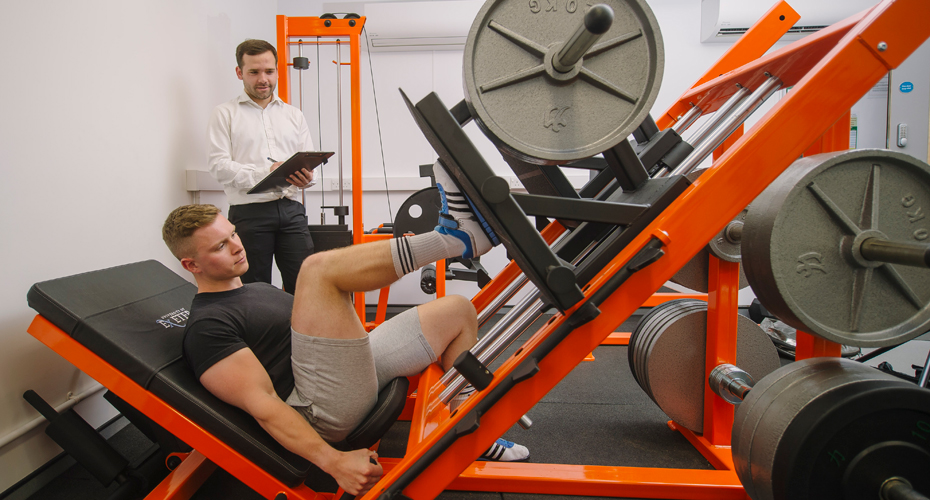Exeter Head Impacts, Brain Injury and Trauma research group (ExHIBIT)
We are a collective of scientists from a variety of research backgrounds (physiology, motor control, psychology, nutrition, medicine), which allow us to uniquely examine the consequences of head impacts from a powerful, interdisciplinary perspective.
This research allows us to better understand player welfare, and the link between head impacts and health outcomes.
Collaborators in this work include UEFA, Exeter Chiefs, Alzheimer's Research UK, The Racing Foundation, The Physiological Society, NIHR Brain Injury, MedTech and Football Association Wales.

Current projects
Nutrition

Testing nutritional interventions to supplement recovery protocols following head impacts
Alongside the group's development of tools to better identify when a significant brain injury has occurred, we also aim to improve recovery from these injuries.
After head impacts, the metabolic profile of brain tissue is altered and impaired. We are developing and testing methods to supplement brain energy production to mitigate the risk of permanent damage using nutratherapeutic approaches.
Vibration injury
Exploring vibration injury on neuromotor control and cerebrovascular function
Repeated exposure to subconcussive head impacts (such as heading in football, participation in boxing/rugby etc) might increase future risk of neurodegenerative diseases.
Vibration injuries are already recognised as a health concern, and exposure to vibrations can cause the brain to “move” inside the skull, potentially causing microtrauma.
Jockeys may routinely expose themselves to vibrations when riding. This work seeks to understand what this exposure is, and then whether this might acutely influence parameters of neuromotor control and cognitive function.
Research team
Researchers: Emma Edwards
Supervisors: Dr Genevieve Williams, Dr Bert Bond
Funded by
Caffeine and the brain

The effects of sleep deprivation and caffeine on cognitive and cerebrovascular function
Habitual poor sleep is understood to be a risk factor for dementia. One of the physiological antecedents of dementia is thought to be an alteration in the ability to meet cerebral metabolic demand with oxygen delivery (the “vascular hypothesis”). This study aims to understand whether acute sleep loss influences this process (neurovascular coupling) and cognitive function.
Following a poor night of sleep, many of us will “rely” on a coffee. Interestingly, caffeine has been shown to acutely decrease brain blood flow, yet increase alertness and cognitive functioning. A second aim of this study will be to see whether caffeine influences any effect of acute sleep loss on our outcomes.
Research team
Researchers: Alice Lester
Supervisors: Dr Bert Bond, Dr Gavin Buckingham
Women's rugby

Head impacts in women’s rugby
The growth in the women’s game is excellent. However, recent high-profile cases of early-onset dementia in former male players have raised questions about whether playing rugby increases the risk of neurodegenerative disease. There is currently no such cohort data available in women players.
We are currently running studies which examine the beliefs and attitudes regarding concussion in women rugby players, and whether markers of brain blood flow regulation are altered over the course of a season.
Research team
Researchers: Jessica Thomas
Supervisors: Dr Bert Bond, Dr Genevieve Williams
Research expertise
We can utilise near infrared spectroscopy (NIRS), transcranial Doppler, duplex carotid sonography and 3T MR imaging to quantify the delivery and regulation of brain blood flow at rest and during a physiological challenge.
These include:
- blood pressure (autoregulation),
- arterial blood gasses (typically CO2 reactivity),
- metabolism (neurovascular coupling)
- and exercise.
We are interested in the development of quantitative tools, that can be quickly and easily used to test for movement, cognition and vision changes after a blow to the head in sport.
Contact Dr Genevieve Williams for more information.
We are able to assess the metabolic activity of living brain cells and tissue. Head trauma and other diseases of the central nervous system are commonly associated with changes in the brain’s ability to produce energy.
By better studying this phenomenon we aim to understand:
- how metabolic changes affect cognitive function and resilience to cell death
- what strategies can we use to support our brain’s responses to injury
For more information contact Dr Paul Weightman Potter
Who we are
ExHIBIT staff
Current ExHIBIT research students
Alumni
- Qais Al-Alem MSc
- Felix Brown BSc (Hons)
- Ishbel Lomax MSc
- Hamish Lorimer BSc (Hons)
- Katie Lynam BSc (Hons)
- Ollie Smail MSc
- Will Wallis MSc
MSc / PhD opportunities
The ExHIBIT team are accepting applications for self-funded postgraduate study. Please email a staff member directly if you would like to discuss possibilities for MSc or PhD study.





